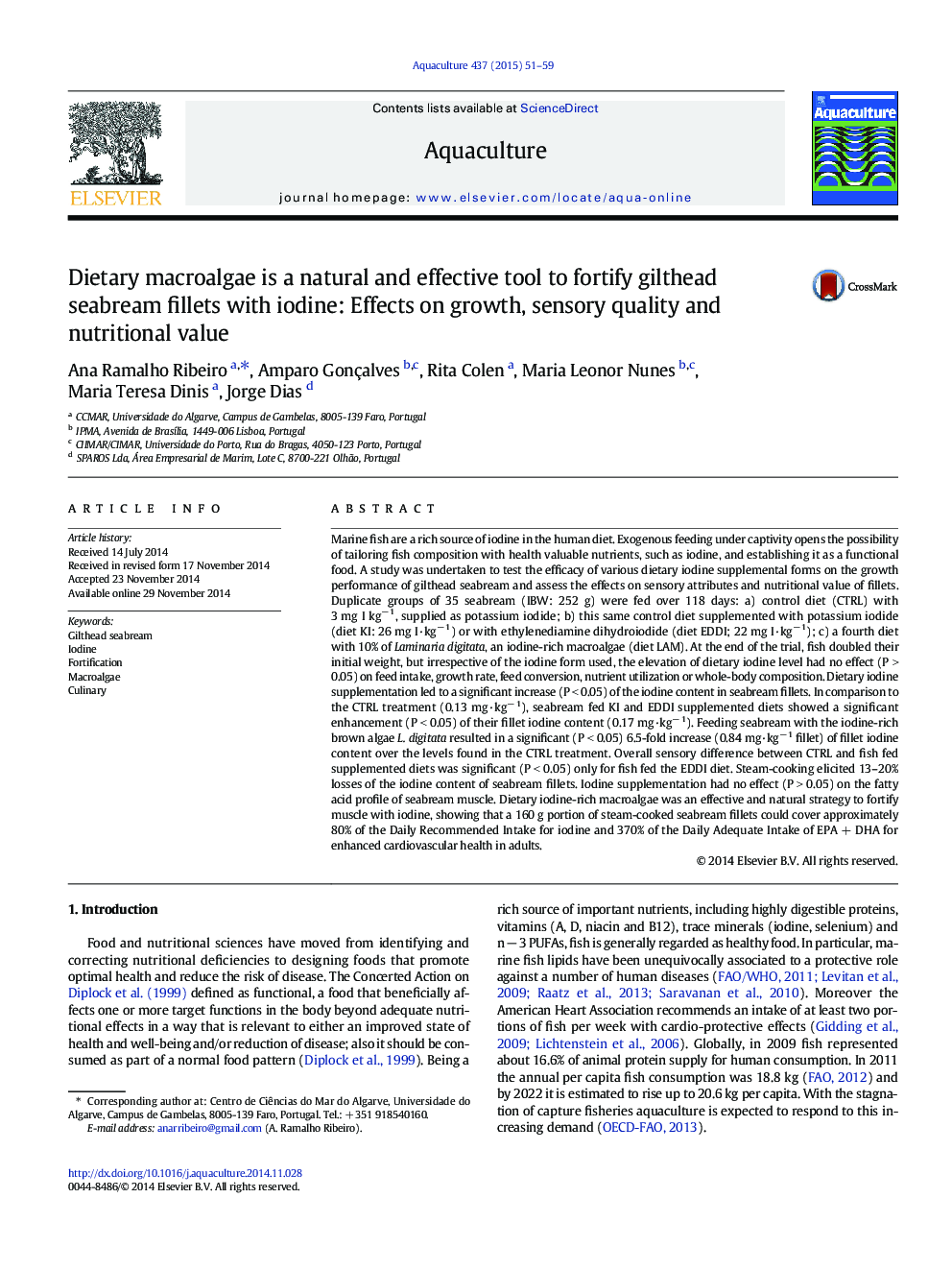| کد مقاله | کد نشریه | سال انتشار | مقاله انگلیسی | نسخه تمام متن |
|---|---|---|---|---|
| 8494710 | 1552850 | 2015 | 9 صفحه PDF | دانلود رایگان |
عنوان انگلیسی مقاله ISI
Dietary macroalgae is a natural and effective tool to fortify gilthead seabream fillets with iodine: Effects on growth, sensory quality and nutritional value
ترجمه فارسی عنوان
کلم بروکلی یک ابزار طبیعی و موثر برای تقویت فیله های گیاه گوشتی با ید می باشد: تاثیر بر رشد، کیفیت حساسیت و ارزش غذایی
دانلود مقاله + سفارش ترجمه
دانلود مقاله ISI انگلیسی
رایگان برای ایرانیان
کلمات کلیدی
موضوعات مرتبط
علوم زیستی و بیوفناوری
علوم کشاورزی و بیولوژیک
علوم آبزیان
چکیده انگلیسی
Marine fish are a rich source of iodine in the human diet. Exogenous feeding under captivity opens the possibility of tailoring fish composition with health valuable nutrients, such as iodine, and establishing it as a functional food. A study was undertaken to test the efficacy of various dietary iodine supplemental forms on the growth performance of gilthead seabream and assess the effects on sensory attributes and nutritional value of fillets. Duplicate groups of 35 seabream (IBW: 252 g) were fed over 118 days: a) control diet (CTRL) with 3 mg I kgâ 1, supplied as potassium iodide; b) this same control diet supplemented with potassium iodide (diet KI: 26 mg I·kgâ 1) or with ethylenediamine dihydroiodide (diet EDDI; 22 mg I·kgâ 1); c) a fourth diet with 10% of Laminaria digitata, an iodine-rich macroalgae (diet LAM). At the end of the trial, fish doubled their initial weight, but irrespective of the iodine form used, the elevation of dietary iodine level had no effect (P > 0.05) on feed intake, growth rate, feed conversion, nutrient utilization or whole-body composition. Dietary iodine supplementation led to a significant increase (P < 0.05) of the iodine content in seabream fillets. In comparison to the CTRL treatment (0.13 mg·kgâ 1), seabream fed KI and EDDI supplemented diets showed a significant enhancement (P < 0.05) of their fillet iodine content (0.17 mg·kgâ 1). Feeding seabream with the iodine-rich brown algae L. digitata resulted in a significant (P < 0.05) 6.5-fold increase (0.84 mg·kgâ 1 fillet) of fillet iodine content over the levels found in the CTRL treatment. Overall sensory difference between CTRL and fish fed supplemented diets was significant (P < 0.05) only for fish fed the EDDI diet. Steam-cooking elicited 13-20% losses of the iodine content of seabream fillets. Iodine supplementation had no effect (P > 0.05) on the fatty acid profile of seabream muscle. Dietary iodine-rich macroalgae was an effective and natural strategy to fortify muscle with iodine, showing that a 160 g portion of steam-cooked seabream fillets could cover approximately 80% of the Daily Recommended Intake for iodine and 370% of the Daily Adequate Intake of EPA + DHA for enhanced cardiovascular health in adults.
ناشر
Database: Elsevier - ScienceDirect (ساینس دایرکت)
Journal: Aquaculture - Volume 437, 1 February 2015, Pages 51-59
Journal: Aquaculture - Volume 437, 1 February 2015, Pages 51-59
نویسندگان
Ana Ramalho Ribeiro, Amparo Gonçalves, Rita Colen, Maria Leonor Nunes, Maria Teresa Dinis, Jorge Dias,
